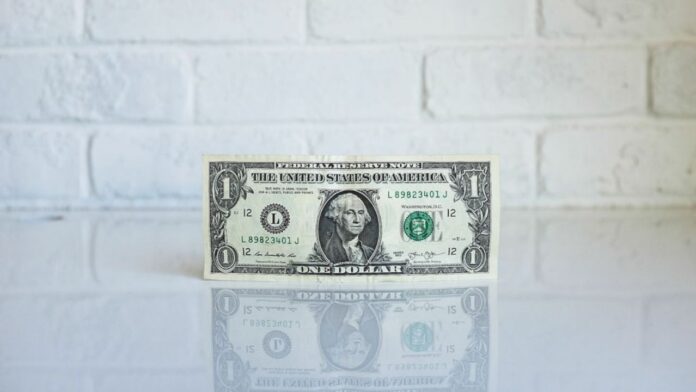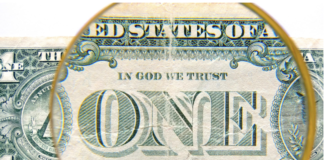“The motto “IN GOD WE TRUST” was placed on United States coins largely because of the increased religious sentiment existing during the Civil War. Secretary of the Treasury Salmon P. Chase received many appeals from devout persons throughout the country, urging that the United States recognize the Deity on United States coins. From Treasury Department records, it appears that the first such appeal came in a letter dated November 13, 1861. It was written to Secretary Chase by Rev. M. R. Watkinson, Minister of the Gospel from Ridleyville, Pennsylvania, and read:
Dear Sir: You are about to submit your annual report to Congress respecting the affairs of the national finances.
One fact touching our currency has hitherto been seriously overlooked. I mean the recognition of the Almighty God in some form on our coins.
You are probably a Christian. What if our Republic were not shattered beyond reconstruction? Would not the antiquaries of succeeding centuries rightly reason from our past that we were a heathen nation? What I propose is that instead of the goddess of liberty we shall have next inside the 13 stars a ring inscribed with the words PERPETUAL UNION; within the ring, the all-seeing eye, crowned with a halo; beneath this eye, the American flag, bearing in its field stars equal to the number of the States united; in the folds of the bars the words GOD, LIBERTY, LAW.
This would make a beautiful coin, to which no possible citizen could object. This would relieve us from the ignominy of heathenism. This would place us openly under the Divine protection we have personally claimed. From my heart, I have felt our national shame in disowning God as not the least of our present national disasters. To you first I address a subject that must be agitated.
As a result, Secretary Chase instructed James Pollock, Director of the Mint at Philadelphia, to prepare a motto, in a letter dated November 20, 1861:
Dear Sir: No nation can be strong except in the strength of God, or safe except in His defense. The trust of our people in God should be declared on our national coins.
You will cause a device to be prepared without unnecessary delay with a motto expressing in the fewest and tersest words possible this national recognition.
It was found that the Act of Congress dated January 18, 1837, prescribed the mottoes and devices that should be placed upon the coins of the United States. This meant that the mint could make no changes without the enactment of additional legislation by Congress. In December 1863, the Director of the Mint submitted designs for the new one-cent coin, two-cent coin, and three-cent coin to Secretary Chase for approval. He proposed that upon the designs of either OUR COUNTRY; OUR GOD or GOD, OUR TRUST should appear as a motto on the coins. In a letter to the Mint Director on December 9, 1863, Secretary Chase stated:
I approve your mottoes, only suggesting that on that with the Washington obverse the motto should begin with the word OUR, so as to read OUR GOD AND OUR COUNTRY. And on that with the shield, it should be changed so as to read: IN GOD WE TRUST.“ [1]
That’s the story of “In God We Trust”. Did you feel the brokenness of the economic system and highly vertical monetization history? Did you see the manipulating power of individuals? What about a higher degree of centralization? The real centralization. They constructed a fully vertical trust mechanism manipulated and managed by centralized powers to create an ecosystem of ever-decreasing value, the US dollar. Since 1971, the US government is printing money as fast as they can. Let’s rewrite this sentence. The most powerful country in the world is deflating the medium of exchange as fast as they can. The meaning for us, world citizens are losing their welfare level for every minted dollar without provision. Wow. In god, how can we trust? Reread this.
So the question arises. How to mend broken hearts? How can we trust again our statesman? Another question. Do we need to trust them? How can we exchange values without trusting centralized systems? How can we decentralize everything for repairing our broken hearts? That’s the blockchain part.
Blockchain is a digital ledger of transactions that is distributed across the entire network of computer systems that enable protocol-based programmable (i.e., smart contracts), decentralized, cryptographic (secure), time-stamped, and immutable transactions. Blockchain empowers the value transfer without trusted parties in a cryptographic way. I can send you a value without saying or getting permission from anyone. The decentralized architecture of the blockchain and the theory of mining enables sending and validating the transactions by itself. Let’s have a bird’ eye view. But not your usual bird’s eye but birds of freedom guard.
With a greater degree of decentralization, empowered by distributed individuals enables greater voice, and choice of individual constituents to influence decisions that affect their lives, and of sub-national and local governments to respond dynamically to constituency concerns. You can hold values anonymously. You don’t need to tell anyone. You can prove your identity without the government. There is always immutable information distributed to the entire network of blockchain that proves your identity in the chain of freedom. Citizens all over the world, do not need a banking system for trading, lending, or borrowing their values. Decentralized Finance (DeFi) creates hope for trusted financial products which are built from tamper-proof digital smart contracts interacting with blockchains. Decentralization allows you to be your own bank, which doesn’t necessarily hold money but values of any kind. Blockchain creates an unalterable record of transactions with end-to-end encryption, which shuts out fraud and unauthorized activity that improves security and privacy. Blockchain is visible and traceable. Blockchain offers freedom. Let’s call freedom 2.0.
Author: Can Kocagil
References
- “U.S. Department of the Treasury.” History of ‘In God We Trust. 01 Nov. 2021. Web. 02 Nov. 2021.



